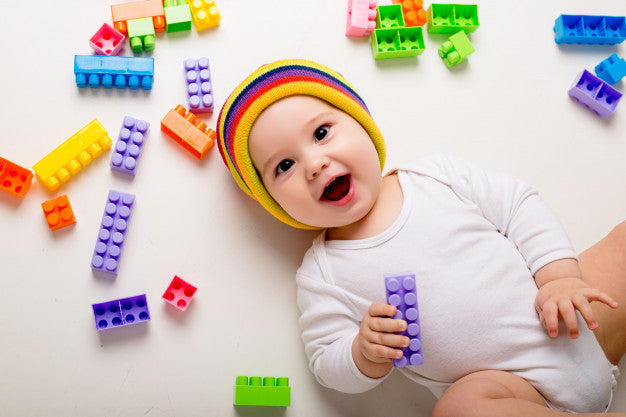- Sign Up Today for 10% OffGet Started
- Join Our Rewards ProgamSign Up
- Now accepting Apple PayShop Now
Easy-to-Use Baby Developmental Milestones Checklist

Children will take their first steps around 12 months. This marks the beginning of their fine motor skills and how they develop.
As a parent, it's important to monitor these milestones and ensure that your child is developing accordingly.
A developmental milestones checklist is perfect to help you understand what stage your child is at and what you can expect in the upcoming months and years.
Here's a checklist guide to provide some insight.
What Are Child Developmental Skills?
Before jumping in, let's look at the different child developmental stages. The first is gross motor skills which involve larger muscle movements of their arms, legs, feet and their entire body. Some examples include crawling, running and jumping.
On the other hand, fine motor skills are acheived when children learn to use their smaller muscles in their hands, fingers and wrists. Some examples include writing, cutting with scissors, eating and other parts that require specific detail and attention.
Language is another part of the developmental stages. You want to see how long it takes for a child to talk, babble, and form cohesive sentences.
Cognitive skills involve learning, problem-solving, and other mental skills.
Lastly, there are social skills. It's important to see how well kids communicate with adults, their peers, and their teachers and how well they can emotionally respond to others.
Now that you have an understanding of the baby's developmental stages, you can take a comprehensive look at each milestone.
What Are the Stages?
Through every stage, you'll find that your baby's progress may be different in comparison to other babies. While it's helpful to understand how baby development generally unfolds, being slower or faster doesn't necessarily mean they are off track.
As long as you are keeping up with your baby's doctor visits, he/she will be able to tell you if any red flags appear.
The First Four Months
During the first month, your baby's senses are still developing but you should notice their head moving from side to side when they lay on their stomach, start to coo and bring their hands up to their eyes and mouth.
In month two, they will hold their head up slightly, begin to follow objects with their eyes and make smaller movements with their arms and legs.
In month three, a baby's emotional skills start to develop. They begin to have different cries for different needs. In addition, they will try reaching for objects, smile when you look at them and turn their heads in the direction of sounds.
In month four, you should find that your baby can push up with their arms. They can also grab objects better, follow moving things from side to side and start to copy facial expressions.
You may also find that they can respond to affection and let you know when they are sad or hungry.
From Five Months to One Year
In months five and six, you should find that your baby likes to play with others, especially with their siblings and parents. They also respond to their own name, can roll over from tummy to back and may be able to sit without support. Babies are curious during these stages, trying to explore items by putting them in their mouths.
At nine months, your baby may have a fear of strangers and will only want to be around people they are familiar with. They may also understand yes and no, start eating solids, play peek-a-boo and will most likely be crawling. In addition, they may pull themselves up to stand and attempt their first step.
When the one year mark approaches, you may find that your baby cries when mom and dad aren't around due to separation anxiety. At one year, they may take a few steps without holding on. When it comes to communication, they may respond to simple requests and directions, say yes or no, dadda or momma or bye bye.
What If Your Child Is Delayed?
If you think your child is delayed, you should visit your pediatrician.
While babies develop at different rates, it's important to see your doctor to track your baby's progress and make sure they are on track.
You may be eligible for services or they may recommend some activities to help speed along the developmental stages.
Why It's Important to Understand the Developmental Milestones Checklist
Keeping track of your baby's milestones is important to understanding their development and behavior. If there are any delays, you can start intervention programs recommended by a doctor or specialist and address it immediately.



